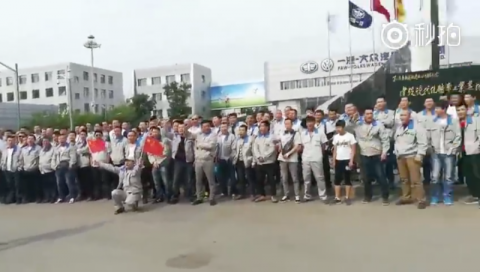
Changchun FAW-VW dispatch workers’ protest action in 2016.
Support Changchun FAW-Volkswagen dispatch workers’ struggle for equal pay for equal work
Globalization Monitor
March 2019
Background
The struggle of Changchun FAW-Volkswagen dispatch workers to defend their right to be paid equally for equal work started in November 2016. They adopted tactics, ranging from meeting with the pro-management union, holding public assemblies, processions, and protests, to urge the automotive joint venture to resolve the wage disparity between dispatch workers and permanent workers, despite carrying out the same duties. However, as the dispute rumbled on, three elected workers’ representatives were also arrested by the police. Representatives Wang Shuai and Ai Zhenyu were later released on bail pending trial, while Fu Tianbo was under criminal detention until February 2019.
Changchun FAW-Volkswagen employed nearly three thousand dispatch workers, who performed the same work as permanent workers but were paid only half the wages and did not enjoy any of the benefits that permanent workers were entitled to. The workers made two simple demands: to be compensated for the shortfall in wages from the past, and for the company to guarantee that dispatch and permanent workers will enjoy same wages and benefits in the future.
According to Article 63 of the Chinese Labour Contract Law, not only are dispatch workers entitled to equal pay for equal work as permanent workers, they can only be employed on a temporary and/or auxiliary basis.1 Nonetheless, most of the dispatch workers at Changchun FAW-Volkswagen have been working continuously in the factory for more than ten years, doing the same jobs. The practice of Changchun FAW-Volkswagen was a deliberate and blatant violation of the Labour Contract Law.
Like many international brand companies, the German automaker’s production model relies on its global supply chain, in which offshore suppliers and factories are responsible for the bulk of the production process. The offshoring and outsourcing of production allow Volkswagen to transfer its responsibilities to follow internationally recognised labour standards to suppliers and factories in other countries. In order to remain competitive within the supply chain, many suppliers choose to employ dispatch workers to reduce production cost. These dispatch workers are severely exploited as they are forced to accept lower wages, longer working hours, and enjoy fewer benefits. This unreasonable and illegal classification of workers intensifies the competition and distrust between workers, and ends up benefitting only the brand companies, suppliers and manufacturers.
Support from afar 1 – German workers support Changchun FAW-Volkswagen workers’ struggle to defend their rights
Workers in Germany understand well the problems facing Chinese workers, as they, too, are victims of globalised supply chains and outsourcing. When they learned about Changchun FAW-Volkswagen workers’ struggle from organisations in Hong Kong, many of them organised solidarity actions to support Chinese dispatch workers’ rightful fight to be treated fairly. These actions included:
1. An open letter co-drafted by the works council of a Mercedes-Benz plant in Bremen and 25 representatives of IG Metall, the dominant metalworkers' union in Germany, in solidarity with Changchun FAW-Volkswagen dispatch workers:
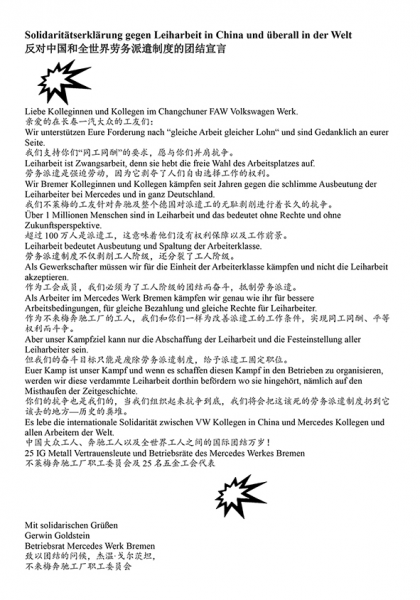
2. A solidarity statement from Leihkeule, a magazine founded by dispatch workers in Germany:
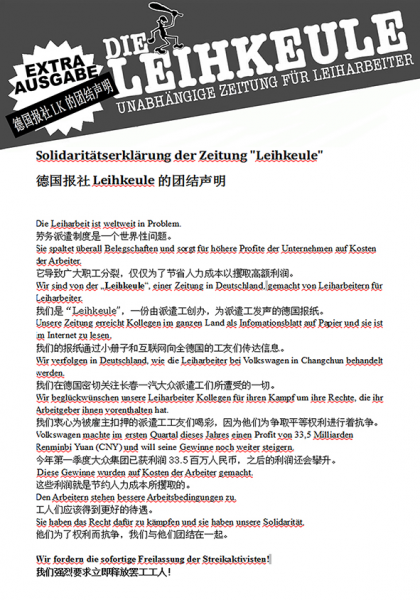
3. A Solidarity statement from IG Leiharbeiter (Interest Community of Temporary Workers):
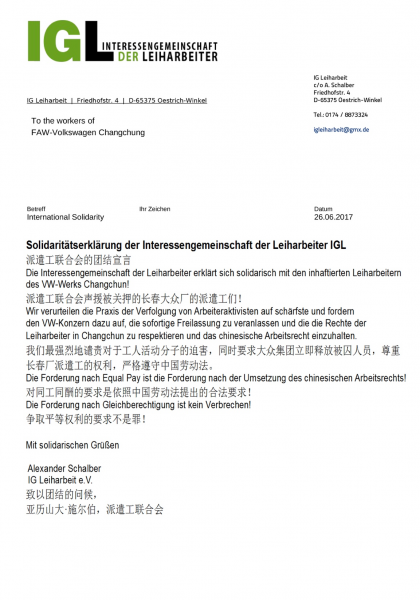
Apart from publishing statements, German workers also participated in the protests against the G20 summit held in Hamburg in July 2017, unfurling banners that supported Changchun FAW-Volkswagen dispatch workers’ demands to be paid equally for equal work and called for the release of dispatch worker representative Fu Tianbo.



(German workers held a banner in Chinese and German supporting Changchun FAW-Volkswagen dispatch workers’ demands to be paid equally for equal work in 7th July 2017.)
Support from afar 2 - Hong Kong labour groups support Changchun FAW-Volkswagen workers' struggle to defend their rights
On 10th November 2017, Globalization Monitor and several local unions and labour groups staged a protest at the Volkswagen showroom in Hong Kong to support the Changchun FAW-Volkswagen workers, urging the Volkswagen head office to take the responsibility to resolve the dispute.2 We had three main demands:
- Changchun FAW-Volkswagenmust compensate their dispatch workers the shortfall in wages they have had to endure in the past years;
- Changchun FAW-Volkswagen must guarantee that in the future, dispatch and permanent workers will enjoy the same wages and benefits;
- Worker representative Fu Tianbo be immediately released by the authorities.

(Hong Kong labour groups staged a protest action outside Volkswagen Hong Kong’s showroom on 10th November 2017.)

(The protesters moved into the Volkswagen showroom and submitted the protest letter.)
Concessions won from the first wave of actions
On 17thNovember 2017, seven days after the solidarity actions in Hong Kong and – coincidentally – one year after the dispute first started, more than two thousand dispatch workers “transferred” into permanent positions. For the workers, this alone did not serve justice, since the new contract signed between Changchun FAW-Volkswagen and former dispatch workers did not recognise their past years of service. With all their seniorities wiped out, these newly “transferred” workers will not receive the pension and/or severance payment they would otherwise be entitled to when they leave the company.3 This is nevertheless a small win for the workers, however with regards to freedom of association, there is still a long fight ahead. In the meantime, Fu Tianbo is yet to be released after more than one year of criminal detention.4
A new wave of actions by the Changchun FAW-Volkswagen workers
On the morning of 14thSeptember 2018, the news went viral that several groups of dispatch workers, who had participated in the previous actions, petitioned the local court to demand their intervention in the dispute. Amongst the protesters were current and former rank-and-file workers and their families, who demanded that the court file to a case against the company in order to secure their livelihoods and defend their right to equal pay for equal work.5 At the same time, some former dispatch workers held a protest in front of the Changchun FAW-Volkswagen factory. It seemed clear that the transition from dispatch to permanent status failed to truly deliver equal pay for equal work:
“Even though the former dispatch workers are now given permanent status, the company never admitted the fact that they have been paid less for carrying out the same duties in the past and it remains unwilling to compensate the workers for the shortfall. The new agreement they signed includes a clause that states, “both parties agree that there are no controversies and/or disputes between themselves.”
Complaints fell on deaf ears
A netizen points out that, “some of FAW-Volkswagen’s former outsourced workers (they are described as outsourced but really they are dispatch workers) are still not entitled to equal pay for equal work after the ‘transfer’. The former dispatch workers complained to the Changchun Intermediate Court, but the court replied they could only urge the company to improve their practices but have no power to regulate them.”
“The Monitoring Committee of the City of Changchun told us that ‘we will urge them to address the issues, but we are not setting ourselves a time limit for any investigation.’ Both the Jilin Province Petition Office and Political and Legal Affairs Commission said ‘it isn’t up to us to decide’. That was all the responses we got for today.”6

(Around 20 dispatch workers chanted “Changchun FAW-Volkswagen, give us back our hard-earned money!” outside the company’s factory on 14th September 2018.)
![2018年9月14日長春一汽大眾派遣工在政府部門前面請願。 維權汗衣寫著: “請政府為我們做主” (前) ;“一汽大眾,同工不同酬, 法院有實不立,還我血汗錢! ” (後) [7]](/sites/default/files/shares/7_0.png)
(Changchun FAW-Volkswagen dispatch workers petitioning outside the governmental offices on 14thSeptember 2018. “We appeal for the government to deliver justice for dispatch workers!” and “FAW-Volkswagen pays us less for the same work, the courts refuse to intervene; give us back our hard-earned money!” are printed on the front and back of their t-shirts.).7
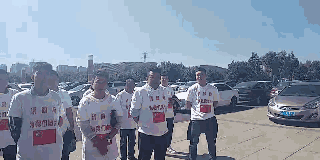
(A group of dispatch workers organised a petition on 14th September 2018 near the Changchun FAW-Volkswagen plant.)
Worker representative Fu Tianbo finally released
In February 2019, Fu Tianbo suddenly posted on his Weibo implying his release:“convicted and exempted from punishment.I come back still a young man. The struggle has just started.” (Posted at 11.59 on 21stFebruary 2019, place: Changchun Intermediate People’s Court).8 He also posted information regarding his employment relationship with Changchun FAW-Volkswagen while replying to a friend on Weibo: “The labour contract has been terminated. Now (I am) initiating civil proceedings against them.”
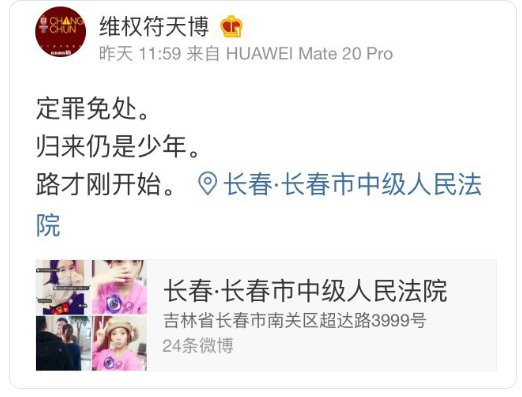
(Fu Tianbo’s Weibo post.)
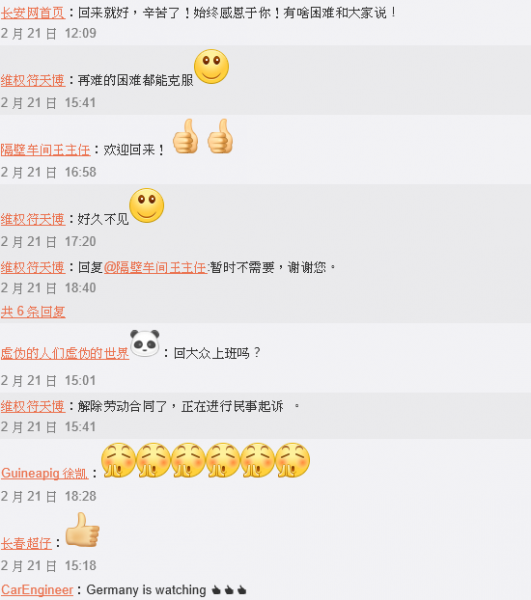
(Fu Tianbo’s friends posted greetings to his Weibo account after learning Fu was released.)
Fu Tianbo’s Weibo bio shows that he is just a thirty-year-old “ordinary rights-defending worker”:

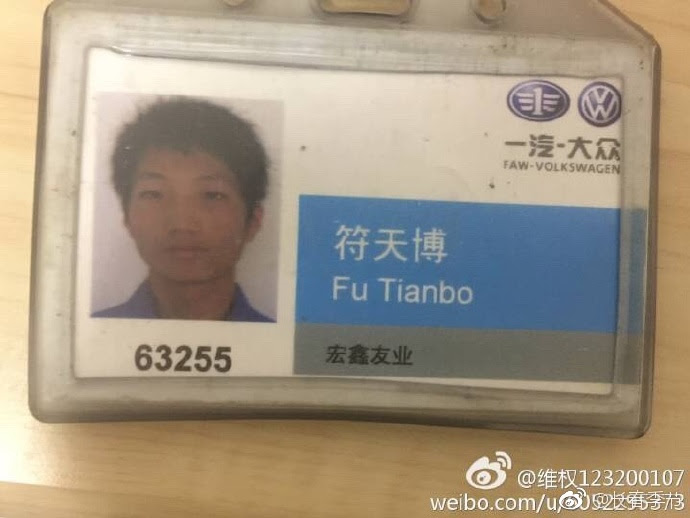
From his arrest in May 2017, Fu Tianbo was put behind bars for more than one year, until he was ‘convicted but exempted from punishment’. But for what crime? Why was he ‘exempted from punishment’if he was convicted of a crime? Since we have no access to Fu’s verdict, there is still no answer for these questions.
According to Article 37 of the Criminal Law of the People’s Republic of China (1997 revised version), “Where the circumstances of a person's crime are minor and do not require sentencing for punishment, an exemption from criminal sanctions may be granted him, but he may, according to the different circumstances of each case, be reprimanded or ordered to make a statement of repentance or formal apology or make compensation for losses, or be subjected to administrative sanctions by the competent department.” 9
Alegal aid NGO worker recalled, “when I studied criminal law twenty years ago, I had never heard of the phrase ‘convicted and exempted from punishment’. The term we learned was ‘exemption from criminal sanctions’, which is similar to this phrase [that Fu Tianbo used].”
“Convicted and exempted from punishment, as the phrase implies, means that you are convicted by the law and found guilty, but you are not held to be criminally liable. This means you would be exempted from criminal detention and imprisonment, for example. However, even when no actual criminal sanctions are imposed, the conviction can still have a huge effect on the person, because he will still be considered a criminal under the law. The crime will be recorded in his file and it could be an obstacle for finding a job and leaving the country in the future.”
We believe that there was no ground to sentence Fu Tianbo because he was demanding – along with other dispatch workers – to be paid equally for the same work as permanent workers, a demand that was met in November 2018 when Changchun FAW-Volkswagen started to employ more than 2000 dispatch workers on “permanent” basis. This demonstrates that the workers’ demands were rightful; whereas the arrests of the worker representatives were not. We have reason to suspect that Fu Tianbo was ‘convicted and exempted from punishment’only to give the authorities a more graceful climb-down.
Conclusion
Fu Tianbo’s release was better late than never and is a source of comfort for solidarity supporters from outside of mainland China. Nonetheless, the new wave of actions by dispatch workers to defend their rights starting from September 2018 shows that their “transition to permanent status” has not been a satisfactory solution to the problem. Many workers still think that they are not paid properly and reasonably, especially those who have been working there for many years. They believe they shall be compensated for the shortfall in wages that they endured in the past, while the group of workers who were laid off due to the “transfer” are now facing difficulties in making ends meet. We can expect the Changchun FAW-Volkswagen dispatch workers’ struggle to defend their rights will continue until there is a more reasonable solution.
[1] http://www.npc.gov.cn/wxzl/gongbao/2013-04/15/content_1811072.htm
[2] https://www.inmediahk.net/node/1054714
[3] https://twitter.com/huangzhaoyun/status/1042707811400970240
[5] https://www.weibo.com/6241442262/GzO7HqFd9?type=comment#_rnd1551868264142
[6] https://maps.clb.org.hk/strikes/zh-cn#201803/201809/10806
[7] https://mp.weixin.qq.com/s/VrDyKrNdE1gsUdYSSbzWXQ, https://twitter.com/huangzhaoyun/status/1042707811400970240
[8] https://www.weibo.com/2101574701/like?from=page_100505_profile&wvr=6&mod=like
[9] http://www.npc.gov.cn/wxzl/gongbao/2000-12/17/content_5004680.htm
